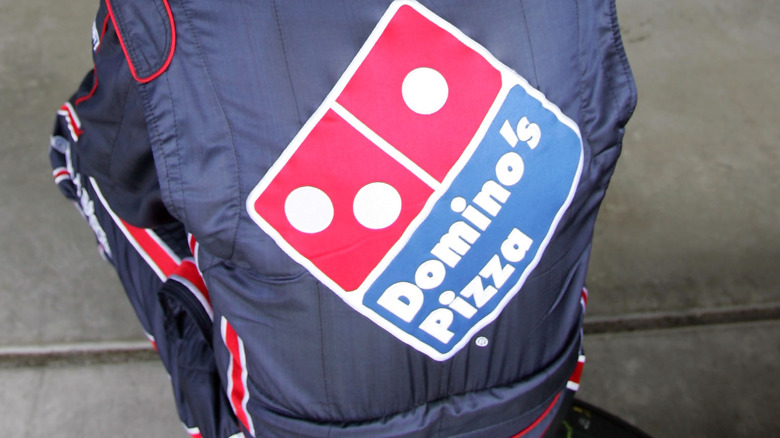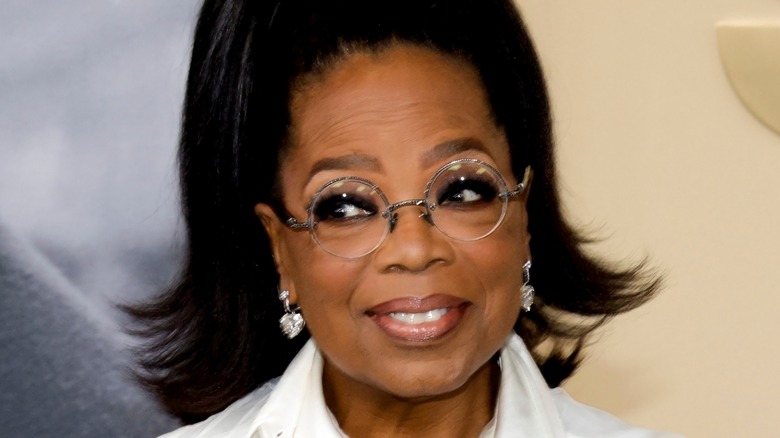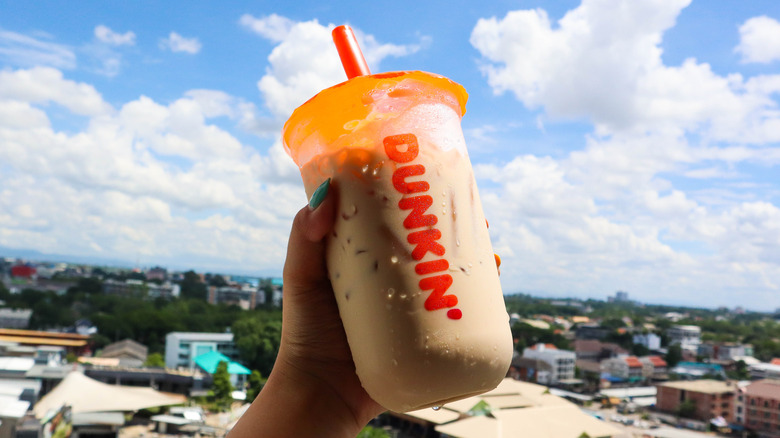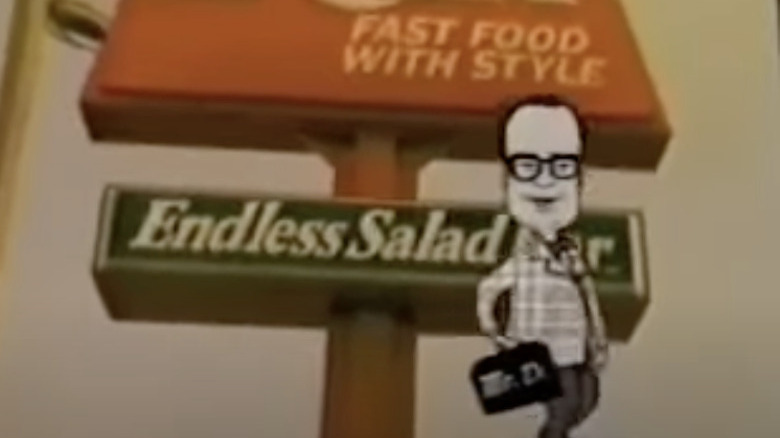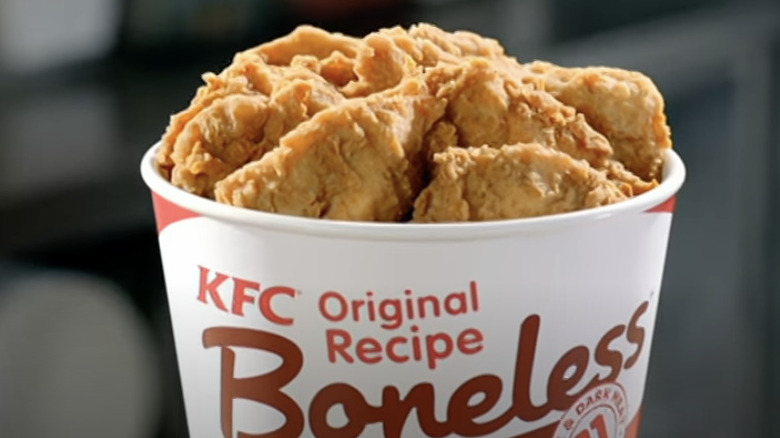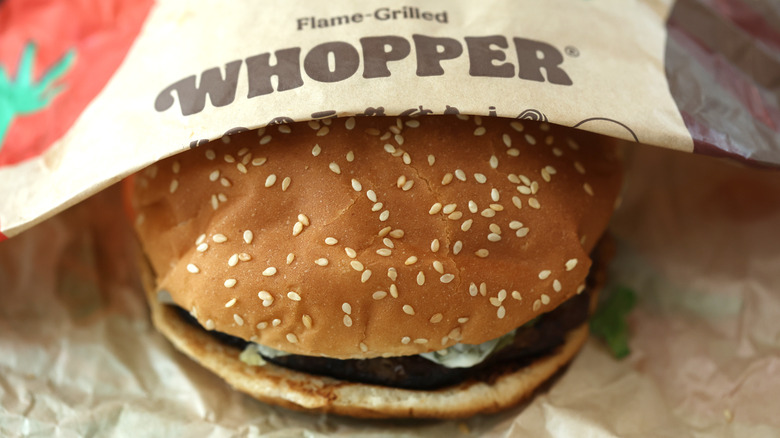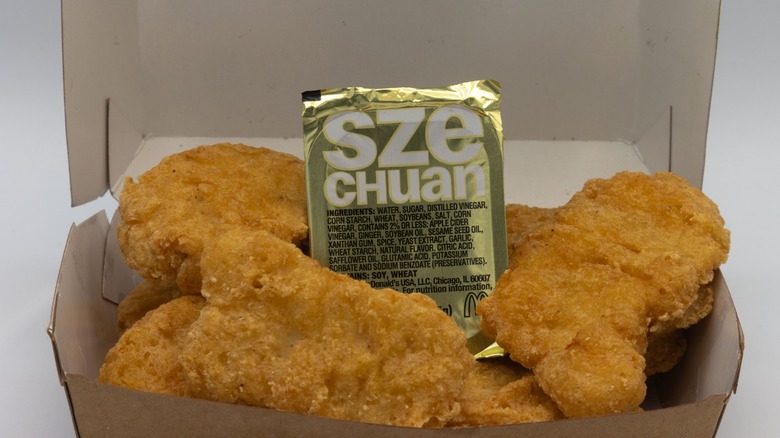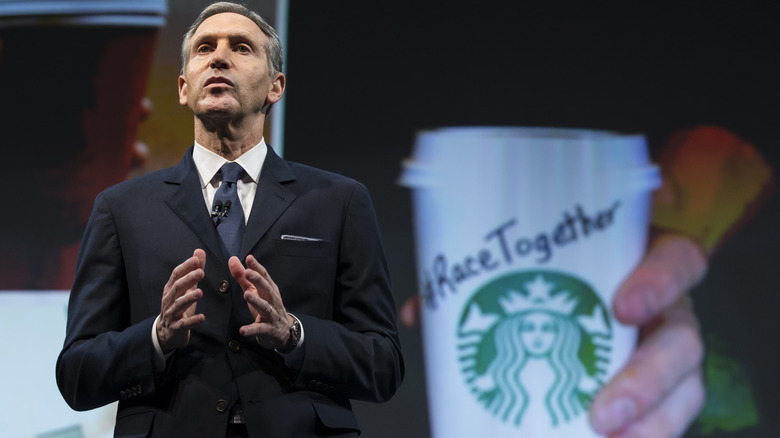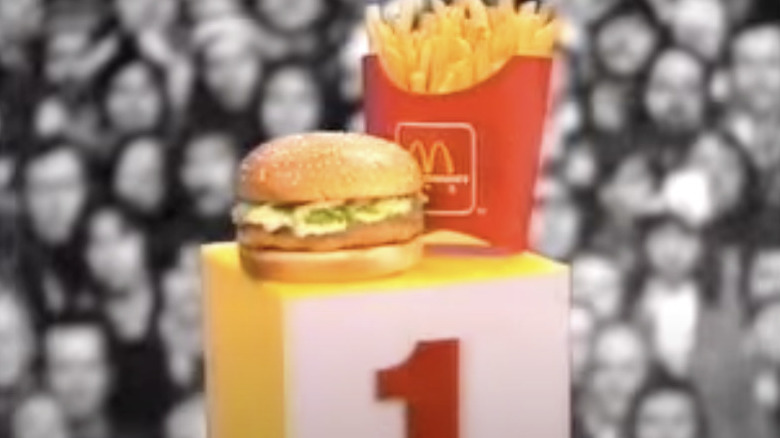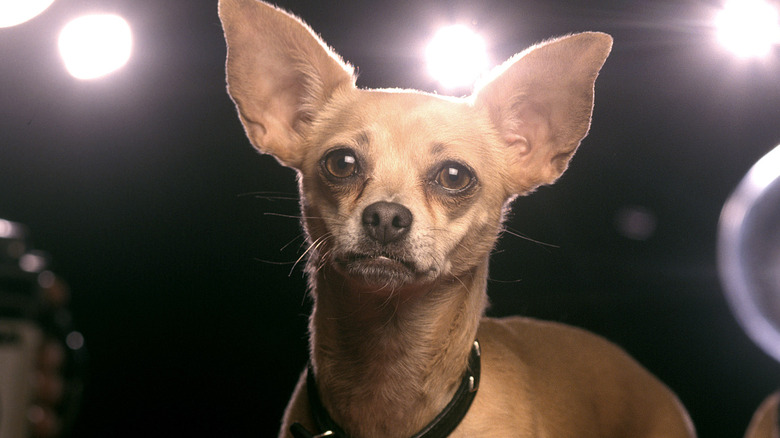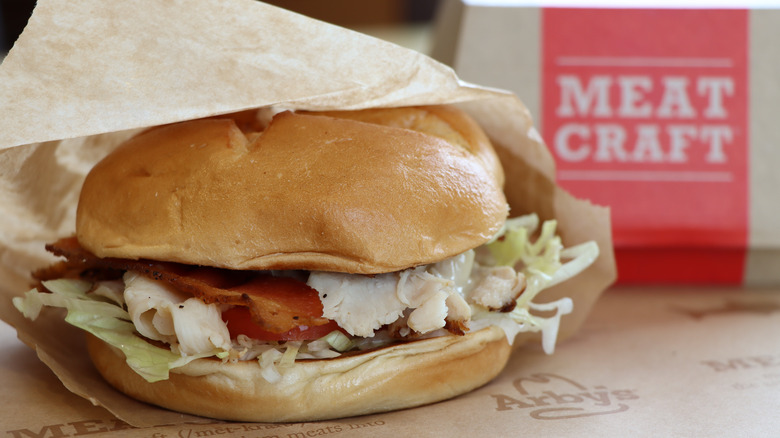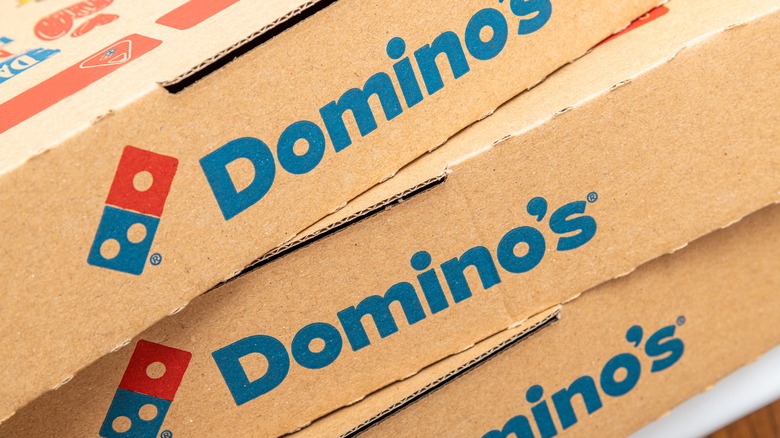The 11 Worst Fast Food Promotions, Ranked
Fast food — or any kind of informal restaurant that serves populist fare up quickly and at a reasonable price — is big business. Americans spend billions each year on swiftly prepared and easily obtained burgers, fries, pizzas, subs, chicken nuggets, roast beef sandwiches, and the like. The potential for profits is so lucrative that the fast food market has completely saturated society, making for a highly competitive field. That means any national fast food place looking to make a buck has to be competitive, and they do that with huge advertising and marketing budgets and a plan to near constantly bombard customers with reminders that they exist and offer can't-be-beat promotions to get them in the door or at the drive-thru window.
The overwhelming majority of the time, these promotions go off without a hitch — customers are enticed, revenue is generated, and maybe even some social media chatter or free publicity gets generated. Other times, the ideas are so poorly planned or are just so botched that customers get upset, the chain loses money, and the social media and press casts a shadow on the whole operation. Here then are the 11 most notorious marketing failures in fast food history.
11. When Oprah helped KFC sell too much chicken
In 2009, KFC rolled out its first major bone-in chicken in years. Kentucky Grilled Chicken came marinated and served without calorically-dense breading. To promote the grilled line, KFC made a deal with Oprah Winfrey, and on a May 2009 episode of her highly-watched titular daytime talk show, the host urged her millions of viewers to go to Oprah.com where they could print out a coupon for a free meal consisting of two pieces of the new chicken, two sides, and a biscuit.
The problem with this promotion was that it worked too well. "The Oprah Winfrey Show" was very popular, and Winfrey's seal of approval could instantly move millions of units if it were featured on her annual "Favorite Things" list or in "Oprah's Book Club." Not only did talk show viewers head right to Oprah.com for that coupon, but so did millions of other people after news spread online. However, many customers couldn't actually download the coupon when Oprah.com became flooded with traffic.
Following reports of long lines, stores running out of product, production substitutions, and angry customers, KFC announced days after the promotion started that outlets would no longer take the downloaded coupons but would issue a raincheck to offset demand. On an episode of "The Oprah Winfrey Show" that subsequently aired, KFC president Roger Eaton confirmed that the company ultimately had to hand over $42 million worth of free food, far above what it anticipated.
10. When free iced coffee was available at just a few Dunkin' outlets
Throughout 2010, Dunkin' Donuts celebrated its own 60th anniversary of opening for business with a series of customer appreciation promotions. Following a "Create Dunkin's Next Donut" competition and free birthday beverages for members of its customer loyalty club, the massive coffee-and-doughnuts chain announced that May 11, 2010 would be Free Iced Coffee Day. News of the event spread all across the nation, via the internet and social media channels.
Usually, that's the kind of free word-of-mouth that big companies enjoy, but in this case, it completely backfired for Dunkin'. Free Iced Coffee Day wasn't a national promotion — in fact, only about a baker's dozen of stores in five states (out of hundreds of Dunkin' locations) had agreed to participate. Dunkin's Facebook page was bombarded with complaints, but that result didn't urge the company to do anything besides encourage customers to read the fine print and release a statement (via The Christian Science Monitor), which explained that as part of its year-long anniversary celebration, "Dunkin' Donuts is offering a variety of regional promotions throughout the year rather than a national Free Iced Coffee Day."
9. When Rax went weird with Mr. Delicious
By the early 1990s, the once popular roast beef sandwich chain Rax was dying, and the company tried out a number of conventional revival tactics to stave off its demise. It introduced salad bars nationwide and diversified its menu by responding to food trends. Those didn't quite work, so in August 1992, Rax took a completely different approach, introducing one of the darkest, strangest, and most irony-laced marketing campaigns in history.
According to The New York Times, Deutsch Inc. aimed to rebrand Rax as a fast food choice for adults and so it introduced ads starring a mascot, Mr. Delicious, that was comically and archly the most adult possible. Mr. Delicious was a balding, middle-aged cartoon man wearing an unhip plaid suit, bow tie, and glasses. He barely talked about Rax's supposedly more mature menu at all, rattling on instead about his divorce, money issues, problems with anger management, and his recent vasectomy, (via YouTube). Three months after the introduction of Mr. Delicious (and his old-timey catchphrase, "Diggity-dee!"), Rax filed for bankruptcy.
8. When KFC encouraged a bone-eating hashtag
In 2013, KFC introduced Original Recipe Boneless, a new line of chicken strips that purportedly tasted almost exactly like the chain's famous and distinctive bone-in fried chicken made with a secret blend of 11 herbs and spices. To promote the product, KFC launched an ad campaign that implied its customers were such gluttonous fools that they would unknowingly devour chicken bones. Commercials featured actors happily eating Original Recipe Boneless and then once they finished their chicken, they would get scared and embarrassed and yell out, "I ate the bones!" Then the ads would explain that no, these people who just explicitly ordered a product called Original Recipe Boneless had not accidentally eaten indigestible bones, but rather had so enjoyed the new menu item and that they had only been fooled into thinking they'd eaten regular KFC fried chicken.
It was supposed to be lighthearted, and KFC tried to keep the promotion going on Twitter by encouraging the use of the hashtag #iatethebones, so people would fess up to their foolishness. It backfired, according to Ready Buzz, when Twitter users added the hashtag to animal rights videos criticizing KFC, pictures of cannibalistic movie serial killer Hannibal Lecter, and images of people choking on bones.
7. When Burger King made fun of places without Burger King
Burger King calls itself the "Home of the Whopper" and has historically touted its signature large hamburger in its marketing and advertising. In 2008, the Whopper figured prominently in a campaign wherein Burger King promoted the sandwich by teasing people who have never eaten one. These real-life "Whopper Virgins" — from places where Burger King wasn't endemic, like Greenland and Transylvania — appeared in a series of man-on-the-street style commercials where they were presented with Whoppers and Big Macs from rival McDonald's. The whole point of the ads seemed to be to gawk and laugh at non-Americans for not being familiar with American things. "They didn't even quite know how to pick it up," one ad pointed out about the Europeans and the sandwiches. "It's embarrassing and emblematic of how ignorant Americans still seem to the rest of the world," AdWeek said. ABC News pointed out that the reason many had never had a Whopper was because they were too poor to afford one.
"Whopper Virgins" was the latest in a string of large-scale blunders for Burger King. In 2009, with sales on the decline, dozens of Burger King locations closed down. "We've been impacted because of marketing faux pas," one franchisee told AdAge.
6. When McDonald's tried to win over Rick and Morty fans
To promote Disney's 1998 ancient China-set "Mulan," McDonald's offered a Szechuan-style Chicken McNuggets dipping sauce. The promotion faded into obscurity until April 2017, when in an episode of Adult Swim's "Rick and Morty," scientist Rick Sanchez mentions in a monologue (via Reddit) that his purpose in life is to once again taste "that 'Mulan,' Szechuan Teriyaki dipping sauce." The "Rick and Morty" fanbase jumped into action, collecting nearly 35,000 signatures on a Change.org petition urging McDonald's to revive the "Mulan" sauce.
After giving away three half-gallon jugs of the stuff to contest winners (and, according to his Twitter page, one to "Rick and Morty" co-creator Justin Roiland) in summer 2017, McDonald's announced that Szechuan sauce would return with the debut of its Buttermilk Crispy Tenders on October 7 of that year (per NME). The day arrived and, according to The Guardian, crowds lined up at multiple McDonald's locations to access the sauce cups, which quickly ran out. According to Slomobo on Twitter, more than 1,000 people showed up to one spot, and police were called when a near-riot broke out with customers chanting "We want sauce!" Some stores never got any supply at all; others received as little as 20 packets. McDonald's publicly apologized to disappointed customers for the promotion that wasn't ever an official tie-in. "We had nothing to do with this McDonald's stuff," Roiland tweeted. "Not happy with how this was handled. Please be cool to the employees. It's not their fault."
5. When Starbucks tried to start a dialogue
It's a slippery slope from earnest to completely failing to nail the proper tone. That's a lesson learned by Starbucks, which certainly had good intentions in mind with its "Race Together" plan in 2015. Starbucks issued a press release, and a video from CEO Howard Schultz, announcing that the chain's thousands of employees would be required to write "Race Together" on coffee cups. That, Schultz said, was supposed to open a respectful, honest, and constructive conversation about racial issues in modern America. This asked a lot of both Starbucks' workers and its customers, to have a nuanced talk about an extremely complicated and sensitive topic in the rushed and busy atmosphere of a coffee shop. To give the public a heads-up and to prepare them for the conversations they might be involved in the next time they picked up their morning cup, USA Today partnered with Starbucks to publish an eight-page booklet of conversation topics about race.
According to FastCompany, "Race Together" racked up 2.5 billion impressions in the 48 hours after its launch, bolstered by Starbucks encouraging customers to answer those conservation starters via the #RaceTogether hashtag on social media. Most of those were critical, Schultz said, fueled by "visceral hate and contempt for the company and for me personally." At any rate, the campaign didn't last.
4. When McDonald's lost millions on a botched Olympics promotion
The U.S. hosted the 1984 Summer Olympics, held in and around Los Angeles, and official sponsor McDonald's created the "U.S. Wins, You Win" campaign. Purchases at McDonald's yielded a scratch-off ticket that bore the name of an event. If an American won a medal in that competition, the customer won a Big Mac (for gold), fries (silver), or soft drink (bronze). The idea was actually a more elaborate repeat of a promotion devised for the 1976 Summer Olympics, and worked so well that McDonald's rolled it out again.
But in the 1984 edition, McDonald's wound up giving away more free food than intended. The Cold War was at its peak in the 1980s, and the U.S. led a multi-national boycott of the 1980 Olympics held in Moscow, capital of the communist Soviet Union. In 1984, the Soviet bloc boycotted in turn. Without powerhouse teams from the Soviet Union, East Germany, and North Korea in the running, Americans had a much easier time securing medals — 174 overall in 1984 as opposed to 94 in the 1976 Summer Olympics. McDonald's had to make good on all those free food scratch-off cards. And then when customers came in to redeem their tickets, they'd get more scratch-off tickets that potentially would win them more food. McDonald's suffered financial losses at every level, and many of the chain's thousands of outlets reported running low or out of Big Macs.
3. When the Taco Bell Chihuahua emerged
In the late 1990s, per the Los Angeles Times, a dog named Gidget with the capacity for speech was somehow both a cultural phenomenon and a massive misfire. In 1998, Taco Bell launched an ad campaign starring a Chihuahua who so loved the chain's tacos and burritos that it approached humans bearing the goodies and stated, "Yo quiero Taco Bell," which is Spanish for "I want Taco Bell." Initially, the Taco Bell Chihuahua was a success — sales increased by 3% in the months after the ads started running and by 9% when stores began selling plush Chihuahua dolls.
However, a lot of people found the whole notion of a Mexican dog breed asking for tacos in Spanish to be more than a bit racist. In the summer of 1998, according to the Los Angeles Times, the California Coalition of Hispanic Organizations called for a boycott of Taco Bell. "To equate a dog with an entire ethnic population is outrageous, despicable, demeaning, and degrading," organization president Mario Obledo said. Taco Bell also had to deal with a lawsuit filed by marketing company Wrench, which alleged that Taco Bell stole the idea from them without payment or credit.
By 2000, Taco Bell's brief, Chihuahua-related successes were over. The company suffered a massive revenue decline that year, leading to the dismissal of its CEO and putting down the Chihuahua campaign.
2. When Arby's made fun of vegetarians
Meat is Arby's whole thing. They proudly sell towering sandwiches full of thinly-sliced roast beef, if not turkey, chicken, ham, or cheese — or with the Meat Mountain, all of them at once. Their slogan is "We have the meats," because indeed they do, but Arby's earned some bad press in 2015 by teasing those who don't eat meat. Vegans and vegetarians eschew animal-based products for reasons ranging from dietary to religious to ethical, none of which Arby's seemed to consider when trying to attract bacon eaters with an ironic ad campaign in 2015. Ads were made to look like public service announcements and took pity on vegetarians, urging any watching to call 1-855-MEAT-HLP (via YouTube). The gist of the campaign: Anybody who avoids meat should abandon their vegetarian lifestyle and go buy an Arby's sandwich made with its newly released brown sugar bacon.
"I sincerely doubt they're going to sway any of the purists," Len Torine, Executive Director of the American Vegetarian Association told the New York Daily News. Some self-identified vegans made a YouTube video of themselves calling the 1-855-MEAT-HLP hotline, which was actually set up. An operator told them to calm down and go eat salads.
The ads ended when the limited-time only brown sugar bacon menu went away, but Arby's doubled down on the vegetarian mockery a year later, introducing a totally meat-free item as a stunt on Leap Day 2016: a bread sandwich.
1. When Domino's 30-minute guarantee led to accidents
Not long after launching as a single pizza parlor in Michigan in the 1960s, Domino's pioneered the now ubiquitous concept of pizza delivery, according to the Los Angeles Times. As Domino's helped popularize pizza over the next few decades, it launched a bold and nearly irresistible campaign to set itself apart and above its many competitors in 1984 — pizzas ordered at a local Domino's would arrive at a customer's home within 30 minutes. If not, they'd get a free pizza.
That's not a lot of time to fully cook, package, and transport a pizza, and in rushing to get its product to customers, Domino's passed the stress on to its delivery drivers. The whole 30-minute guarantee ultimately and tragically led to severe injuries, deaths, and lawsuits, all of which severely damaged Domino's reputation and finances.
There were so many accidents involving guarantees like the one offered by Domino's that the Delivery Service Negligence Group, an attorney organization, formed to handle the legal ramifications. In 1993, Domino's was on the hook for $2.8 million to the family of a woman in Indiana who was killed by a speeding Domino's driver. In 1989, a rushing Domino's driver in St. Louis passed through a red light and crashed into a car driven by a woman who endured near-fatal head and spinal injuries. In the 1993 lawsuit that followed, a jury ordered Domino's to pay the woman $79 million — which is when the company finally canceled the 30-minute guarantee.
